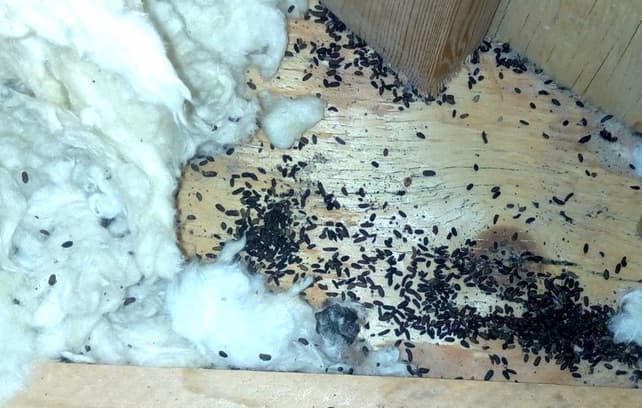Successful wildlife removal from an attic in Toronto is definitely a cause for celebration but most likely has to be followed by attic restoration. Wildlife such as raccoons, rats, mice, birds and squirrels wreck havoc on the insulation and compromise it in a number of ways. A professional can assess the damage and recommend the right course of action (insulation removal or complete attic cleaning).
Risk of Diseases: the diseases spread by wildlife feces and urine is well documented and includes leptospirosis, Salmonellosis, Histoplasmosis and Hantavirus Pulmonary Syndrome among others. Most wildlife designates a spot in the attic to use as a toilet and the high concentration of urine and feces seep deep in the insulation. Many of these pathogens are airborne thus increasing the chances of contracting a disease. Cleaning may not be an option especially in a large infestation and may require the insulation to be replaced entirely.
Parasites: most wildlife carries parasites including ticks, bedbugs and fleas. These parasites are often left behind during the wildlife eviction and will look for alternative hosts which in this case are humans and pets. Apart from painful bites, these parasites carry diseases including Typhus, Mycoplasma Haemofelis and Lyme disease among others.
Recurring wildlife invasions: wildlife in the attic may burrow through the insulation or tear big chunks to use for their nests. This leaves gaping holes that other wildlife can use to get into the attic. The problem is made worse by the fact that wildlife urine contains pheromones that can be detected for up to a kilometer or more by other wildlife, alerting them to a possible nesting place in your attic.
Energy efficiency issues: if you notice higher-than-usual energy bill after wildlife removal, there is a good chance that the animals damaged your insulation. Gaps and holes in the insulation compromise energy efficiency leading to higher energy bills, undue strain of your HVAC system and inefficient heating and cooling especially in extreme weather.
Hire a technician from a wildlife removal company to assess the damage and make recommendations regarding your insulation. Working on your own in cramped attic spaces is not a good idea especially given the risk of inhaling pathogens and toxic exposed insulation fibers.

